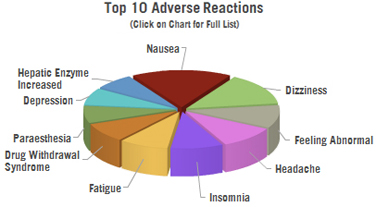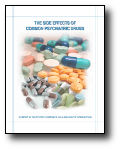 The documented risks of these drugs are provided so the public can make informed, educated decisions.Cymbalta is a newer antidepressant drug. The U.S. Food and Drug Administration warns that antidepressants can cause suicidal thinking and behavior in children and young adults. Cymbalta is also known as Duloxetine, Xeristar, Yentreve.
The documented risks of these drugs are provided so the public can make informed, educated decisions.Cymbalta is a newer antidepressant drug. The U.S. Food and Drug Administration warns that antidepressants can cause suicidal thinking and behavior in children and young adults. Cymbalta is also known as Duloxetine, Xeristar, Yentreve.
To see the total figures from IQVia on the number of people taking antidepressants in the U.S., click here.
Please note: No one should attempt to get off of psychiatric drugs without a doctor’s supervision. To help find medical practitioners in your area, click here.
Also, read the FDA’s Cymbalta Medication Guide for more information. MedGuides include “the particular serious and significant public health concern that has created the need for the Medication Guide” and notes “pediatric risks.” (Note: Unfortunately, the FDA MedGuides only work on a desktop, not on a mobile device. Please complain to the FDA to make their public advisories accessible to all. 1-888-INFO-FDA or 1-888-463-6332.)
Cymbalta Drug Warnings:
There have been 15 drug regulatory agency warnings from three countries (Australia, Japan and United States) and the European Union on Cymbalta (or duloxetine). These include the following (note that some warnings cite more than one side effect, so the list below may not be equal to the total number of warnings):
8 warnings on Cymbalta causing suicide risk or suicidal behavior
3 warnings on Cymbalta causing withdrawal reactions
3 warnings on Cymbalta causing Serotonin Syndrome
2 warnings on Cymbalta causing blood pressure changes or high or low blood pressure
2 warnings on Cymbalta causing liver problems
1 warning on Cymbalta causing hostility or aggression
1 warning on Cymbalta causing agitation
1 warning on Cymbalta causing abnormal behavior
1 warning on Cymbalta causing blood disorders
1 warning on Cymbalta causing eye problems
1 warning on Cymbalta causing allergic reactions
1 warning on Cymbalta causing lack of efficacy
1 warning on Cymbalta causing risk of falls
Cymbalta Drug Studies:
There have been 14 studies done in 14 countries (Australia, Brazil, China, Denmark, France, Italy, Netherlands, Portugal, Spain, Switzerland, Taiwan, Turkey, United Kingdom and United States) on Cymbalta (or duloxetine). These include the following (note that some studies cite more than one side effect, so the list below may not be equal to the total number of studies):
2 studies on Cymbalta causing sexual dysfunction
2 studies on Cymbalta causing liver problems
1 study on Cymbalta causing newborn complications
1 study on Cymbalta causing suicide risk or attempts
1 study on Cymbalta causing lack of efficacy
1 study on Cymbalta causing gastrointestinal problems
1 study on Cymbalta causing birth complications
1 study on Cymbalta causing premature birth
1 study on Cymbalta causing skin conditions
1 study on Cymbalta causing risk of falls
1 study on Cymbalta causing pregnancy complications
1 study on Cymbalta causing involuntary movements
1 study on Cymbalta causing nervous system disorders
1 study on Cymbalta causing diabetes
1 study on Cymbalta causing violence
1 study on Cymbalta causing hostility or aggression
1 study on Cymbalta causing weight gain
1 study on Cymbalta causing allergic reactions
1 study on Cymbalta causing homicide or homicidal ideation
Top Reactions for All Ages: There have been 16,623 adverse reactions reported to the US FDA in connection with Cymbalta.
The FDA estimates that less than 1% of all serious events are ever reported to it, so the actual number of side effects occurring are most certainly higher.
- 1,831 cases of nausea
- 1,471 cases of dizziness
- 1,058 cases of feeling abnormal
- 1,052 cases of headaches
- 960 cases of insomnia
- 906 cases of fatigue
- 896 cases of drug withdrawal syndrome
- 786 cases of paraesthesia (abnormal sensation such as burning, prickling, tingling, etc.)
- 784 cases of depression
- 738 cases of hepatic enzyme increased
Documented Side Effects of Cymbalta:
Source: Physicians Desk Reference, National Institutes of Health’s Medline Plus, and/or the drug label.
Abdominal pain
Blisters/peeling skin
Blurred vision
Confusion
Difficulty breathing/swallowing
Dizziness
Hives
Insomnia
Irregular heartbeat
Loss of appetite
Nausea
Sexual dysfunction
Somnolence
Swelling of the abdomen
Swelling of the face, hands, feet or lower legs
Uncontrollable shaking
Unusual bruising/ bleeding
Yellowing of the skin/eyes
Click here to learn more >>
This brochure is a simple guide that documents the dangerous and deadly side effects of the drugs prescribed to millions of men, women and children diagnosed with bogus mental disorders.



 Download The Side Effects of Common
Download The Side Effects of Common
SHARE YOUR STORY/COMMENT